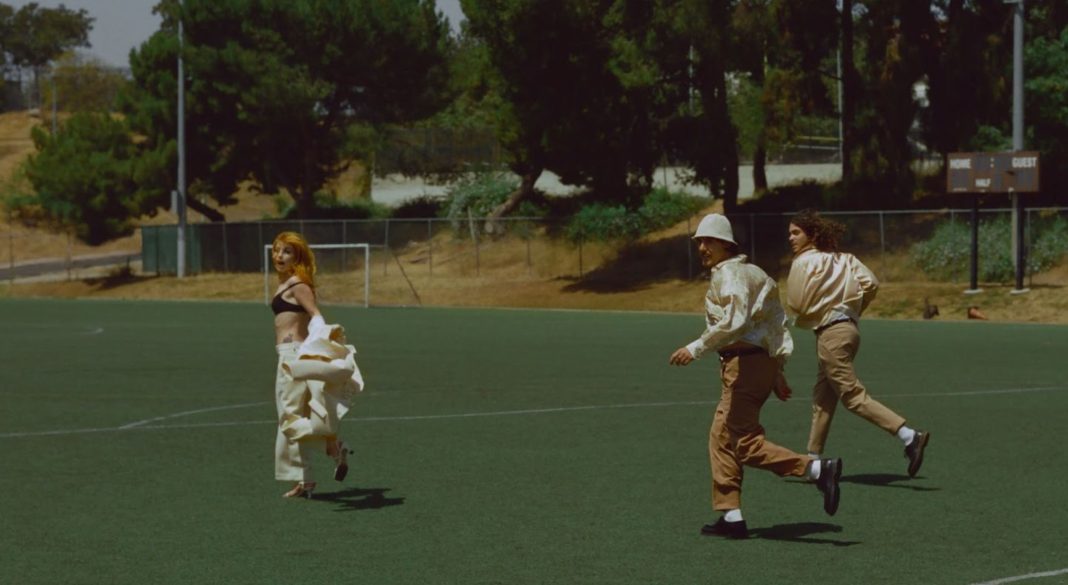With lipstick-stained teeth and smeared make-up, there is something in the artwork of Paramore ‘Re: This Is Why’ that instantly feels like the perfect after-party. Offering an extra layer of duality to a record that was already pretty deep, it’s a new look for Paramore, and a new way of marketing their music, extending out their comeback era with aplomb.
But when it comes to remixing more generally, everyone seems to be at it: Demi Lovato, London Grammar, Jockstrap, even noughties faves Busted, who scored a number one record last week with ‘Greatest Hits’ 2.0, featuring pop-punk collab-covers of their biggest hits by the likes of Simple Plan, All Time Low and YouMeAtSix. Re-dos are having a moment, and both artists and fans appear to be enjoying the chance to wind things back for another look.
In its premise, ‘Paramore’s Re: This Is Why” feels a little more intriguing than your classic remix record. According to Hayley Williams, it was designed as a chance to build on all the relationships they have established with their core influences and touring buddies, letting them play around in the ‘This Is Why’ universe on the terms that best serve them.
While there’s entry-level fun to be had in Foals, Zane Lowe and The Linda Lindas more straightforward club remixes of ‘This Is Why’, ‘Running Out Of Time’ and ‘The News’, the fresh new covers work the best. Remi Wolf’s version of ‘You First’ feels vibrant and pulsating, while ‘C’est Comme Ça’ was so clearly influenced by Wet Leg’s deadpan delivery in the first place that it’s great to see the baton passed back, becoming a chic, cowbell-bashing ditty.
Elsewhere, DOMi & JD Beck’s smooth Gran Turismo take on ‘Big Man, Little Dignity’ builds on Paramore’s R&B-soul sensibilities, while Romy finds the most delicate parts of ‘Liar’ and builds in fresh dialogue, lavishing in the romance of call-and-response songwriting. Perhaps best of all is Bartees Strange’s beguiling, gothic version of ‘Figure 8’ — a track he really does manage to make his own, and one which will undoubtedly serve to spread word of his talents to a whole new audience.
While it’s always fun to hear what an artist makes of someone else’s work, some listeners may suspect that albums like this are nothing more than a cynical cash-in. There can be no denying that Paramore are bigger than they’ve ever been, and ahead of their UK run of shows with Taylor Swift, it makes smart business sense to capitalise on this visibility, to eke out fan loyalty by giving them something new to purchase. Similarly, as is the case with Busted or London Grammar, remix albums can be percieved as a business-savvy way to stir sensations of nostalgia, supplementing the financial possibilities of a new era by tugging on people’s memory-based heartstrings.
However, there are significant signs that the current appetite for remix albums may go deeper than your basic moneygrab. Audiences have become more genre-fluid in their listening habits than ever before, but their attention spans have also become shorter, often wanting more than an artist can really keep up with. With the rise of AI, audiences have been able to take matters into their own hands, seeing remixes or reimaginings as an easy way to keep things moving and explore potential futures without waiting for new original material.
“I do wonder if [the increase in remix albums] is a reaction to the kinds of quick-fire reimaginings people do that go viral on TikTok, a way for artists to pre-empt that interest and centralise their own agency,” says Maria Perevedenseva, Lecturer in Musicology at the University of Salford. “Good remixes can go down like liquid gold in dance music contexts especially; they become the kind of musical debris that diggers will be hunting for once an original pop-cultural moment has expired, and may even have a longer shelf-life than the originals themselves in some spaces.”
According to Ed Spencer, a postdoctoral music researcher at The University of Manchester, the abundance of remixes and mashups that we’re all experiencing online doesn’t even have to come from a place of particular homage. “Remixing can be a way of hooking in both fans and anti-fans of different genres — a form of musical (click)baiting,” he says. “We might assume that there is often a sort of prestige imitation going on, but occasionally remixes can be more overtly sardonic. This is especially the case in the US ‘brostep’ scene, where remixing is sometimes a deliberately controversial practice designed to maximise attention and impact.”
This sense of humour or edgy surrealism certainly explains why many of us as fans are prone to making remixes ourselves. As a ton of currently trending TikToks will attest, there is something deeply entertaining — even potentially queer-coded — about the off-kilter familiarity of layering something like the Harry Potter chess scene over pulsing EDM, looking camp right in the eye. By taking something that we think we know and viewing it from a new angle, remixes allow us to imagine alternative realities, to make nostalgic jokes, or potentially even to challenge the terms under which the original was created, inviting a whole new range of creative readings.
Artists will not be immune to this kind of viral, meme-y appeal. If you think about Demi Lovato’s recent ‘Revamped’ album, there’s definitely a knowing wink to the renewed popularity of emo and pop-punk, an artist having their fun by seeing what ‘clean’ pop tracks like ‘Cool For The Summer’ and ‘Sorry Not Sorry’ might sound like if they got down and dirty. But there’s also a hefty sense of artistic vindication, of getting to properly belt your songs out and unleash talents that haven’t been fully seen or appreciated before.
In this sense, artist-led remix projects can be as simple as trying to seek justice for old eras, to capture a sound or emotion that maybe they didn’t feel capable of fully achieving before. mxmtoon, the bedroom-pop artist who went TikTok viral at the age of 17, has recently announced a re-imagined version of ‘Plum Blossom’, an EP collection of the songs that propelled her to fame. In a press release for the record, she describes it as a healthy moment of pause, a way of thanking fans for joining her on this journey before she moves on to whatever is next:
“A lot of change happens over the course of five years, and that’s especially true when you go from being a teenager to an adult within that space,” she writes. “I didn’t have the tools or vocabulary to effectively get every idea I had in my head into song at that point, so the music I was making never quite made it into the form I had envisioned. Now, at twenty-three, I’m so grateful to say I do have the resources to make those dreams come true for my younger self, to honour and thank her for being brave enough to even make art in the first place.”
Whatever an artist’s motivations, we do appear to be moving towards a model where no musical era is ever really over. From (Kan)ye West tinkering with ‘The Life Of Pablo’ even after it was technically released to artists reissuing albums with bonus tracks and ‘vault’ content (see Taylor Swift, or Boygenius’ forthcoming ‘the rest’ EP), remix and expansion-remix culture is a great way to connect with fans, to keep the story going or even encourage them to get more creative in their own listening habits. Where some artists might potentially be accused of not making the best of a remix opportunity (see Busted’s bloke-heavy representation of the pop-punk scene, with only one featured female artist), there’s something pretty cool about getting an extra peek behind the scenes, of being able to more closely understand somebody’s process and growth.
In the words of Hayley Williams, the fact that ‘Re: This Is Why’ even exists is a testament to community spirit — to artists being able to have fun in shouting each other out and trying new things. “It’s very hard to organise musicians – we’re not the easiest people,” she said this week, speaking to Jimmy Fallon. “So this is a feat. This is a miracle.”
Whether you’re a P’more hardcore or simply up for seeing musicians at play, remix culture seems like a miracle work protecting; a way for artists to be fans, and for fans to get that little bit extra — with no need to put an ill-advised donk on anything for themselves.
READ MORE: Growing up with Hayley Williams







